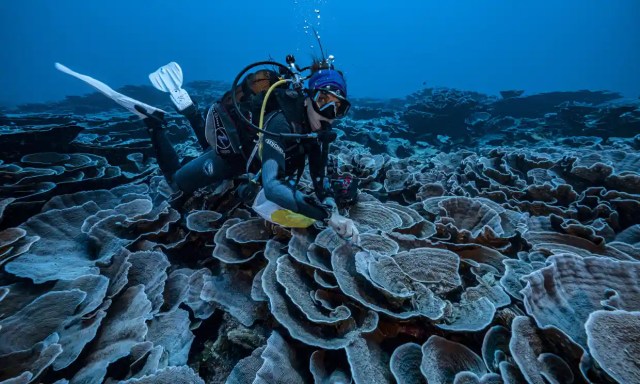John Bader
31st January, 2022
“It’s a work of art!” said French underwater photographer Alexis Rosenfeld, describing the 3km untouched reef, covered with rose shaped corals.
The coral reef, discovered in November last year off the coast of Tahiti, French Polynesia, is one of the largest to be discovered at a depth of 30 meters. Such depths, called the ocean’s “twilight zone”, are known for lower temperatures and low sunlight levels, two properties that are not ideal for corals to survive.
“It was magical to witness giant, beautiful rose corals stretching as far as the eye can see”.
~ Alexis Roselfeld, underwater photographer

The discovery of this reef opens the possibility that more untouched ecosystems are waiting to be discovered at this depth. “We still associate corals with the shallowest tropical seas but here we find a huge previously unknown coral reef system” explained Prof Murray Roberts, a marine scientist from the University of Edinburgh.
While shallower seabeds can be prone to more damage, including higher CO2 concentration, higher temperatures, and higher exposure to sunlight, deeper ones suffer less of such damage. As a result, this newly discovered coral reef does not seem to have suffered such damage, as compared to neighboring reefs in shallower waters in 2019.
“As shallow waters warm faster than the deeper waters we may find these deeper reef systems are refuges for corals in the future. We need to get out there to map these special places, understand their ecological role and make sure we protect them for the future.”
~ Prof. Prof Murray Roberts, University of Edinbrugh.
The need to map the yet-to-be discovered ecosystems deeper in the ocean has also been emphasized by Dr Julian Barbiere, from Unesco. “There are probably many more of these ecosystems that we just don’t know about. We should be working to map them and to protect them,” he said.
_______
The next time you use your reusable straw to protect the turtles, be reminded that there are many more species and whole ecosystems that are also being equally impacted by climate change and need to be protected.
_______
John Bader is the News Editor for I,Science and is studying an MSc in Science Media Production at Imperial College London






More Stories
Promising bee vaccine welcomed by hobbyists as part of kinder attitude to nature
Global life expectancy set to soar by 2050 despite rising health challenges, study finds
Most countries failed to achieve their CO2 emissions targets for 2020, study finds